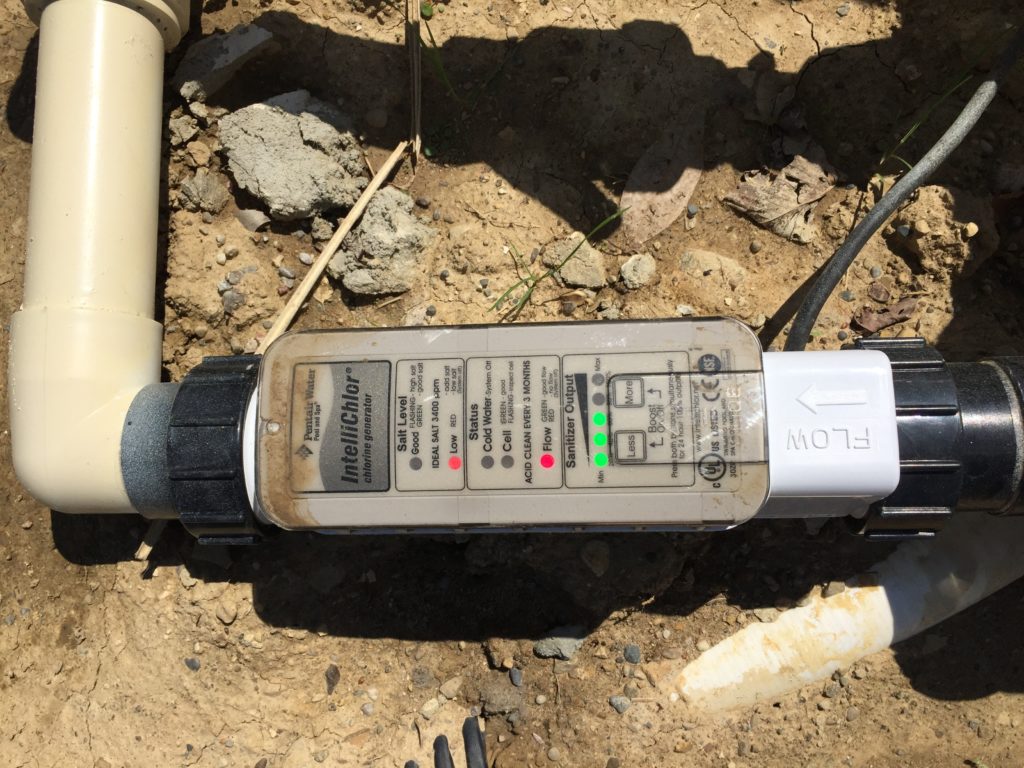
Salt water pools -which are chlorine-generating pools, are growing in popularity and not as salty as you may think.
Ask the Pool Guy recommends the Pentair intelliChlor Salt Generator or the Jandy AquaPure for new swimming pool installations.
What is a salt system?
Salt systems are a huge upcoming trend in pool construction. They are also known as ‘chlorine generating pools’. They use ordinary salt and break it apart into sodium and chlorine. The chlorine is the chemical that cleans the pool and water. Once the chlorine has done its job in your salt system pool, it reconnects with the sodium and turns back into salt. These pools are efficient because the salt is recycled continuously, day after day, reducing maintenance requirements even more. They are the easiest, most effective and convenient way to keep your pool clean. Concerned about pool sanitation? Don’t worry, salt system pools provide the same amount of of sanitation as manual chlorine pools. They just don’t come with the drawbacks of handling chlorine. With salt system pools you’ll never have to deal with the smell, bleaching, or stinging of chlorine again.
Al from Ask the Pool Guy loves salt systems. He says, “They’re great because it keeps people from having to handle chemicals. Adding salt to a pool is a whole lot easier and safer than adding chlorine.” When asked about the maintenance requirements of salt water pools Al also says, “The chemical process that happens is amazing- it constantly recycles the salt so you don’t have to add salt nearly as often as you would have to add chlorine in a standard swimming pool.”
Pentair intelliChlor Chlorine Generator
Saltwater swimming pools are what’s trending right now. Consumers like them because there is no need to deal with harsh chemicals, and they can leave your skin feeling silky smooth after you get out of the water. Traditional chlorine pools can dry out skin and even cause irritations: not to mention it can discolor swimming suits. With a salt water pool you absolutely need a chlorine generator. Ask the Pool Guy recommends an ic 40 chlorine generator by Pentair or the AquaPure by Jandy (not available online)
Chlorine generators do all the work of handling, storing, and adding chlorine to the pool for you. It’s an automatic generator that will constantly produce chlorine for the pool. They produce chlorine by separating the sodium and chlorine (NaCl) molecules in the salt. This will then keep the pool free of bacteria and algae. Because these pieces of equipment need some salt in the water in order to run properly, chlorine generators are generally only used in saltwater pools.
How Chlorine Generators Work
They work through the process of electrolysis. First, water is passed over the chlorine generator. The salt (NaCl) molecules are separated and chlorine is produced. The chlorine is then instantly transformed into hypochlorous acid. This is the main cleaning agent in chlorine and what kills algae and bacteria. This, along with a combination of proper pool maintenance and proper pH levels, will keep your pool running smoothly.
It’s important to remember that for chlorine to be generating your pool has to be running. Depending on the size of your pool you may need to run it 24/7 if you install a 30k gal unit on a residential pool. For extra large pools, more than one cell is recommended. There are also units being made for smaller, above ground pools as well.
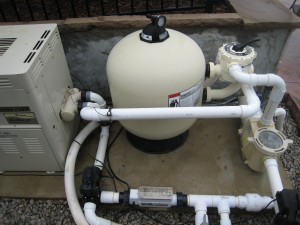
The salt level for a safe, chlorinated pool is about 2,500 to 4,000 PPM (parts per million). Most people can’t taste salt until the PPM is around 5,000. That means it’s not even noticeable. It freaks a lot of people out to dump salt directly into their pools, especially in the quantity that is necessary. But it’s important to remember how many gallons are in your pool. With the huge quantity of water in a swimming pool, the ratio of salt to water is about a teaspoon per gallon. If you’re worried about how salty your pool might taste, you can test it by simply putting a teaspoon of salt into a gallon of water.
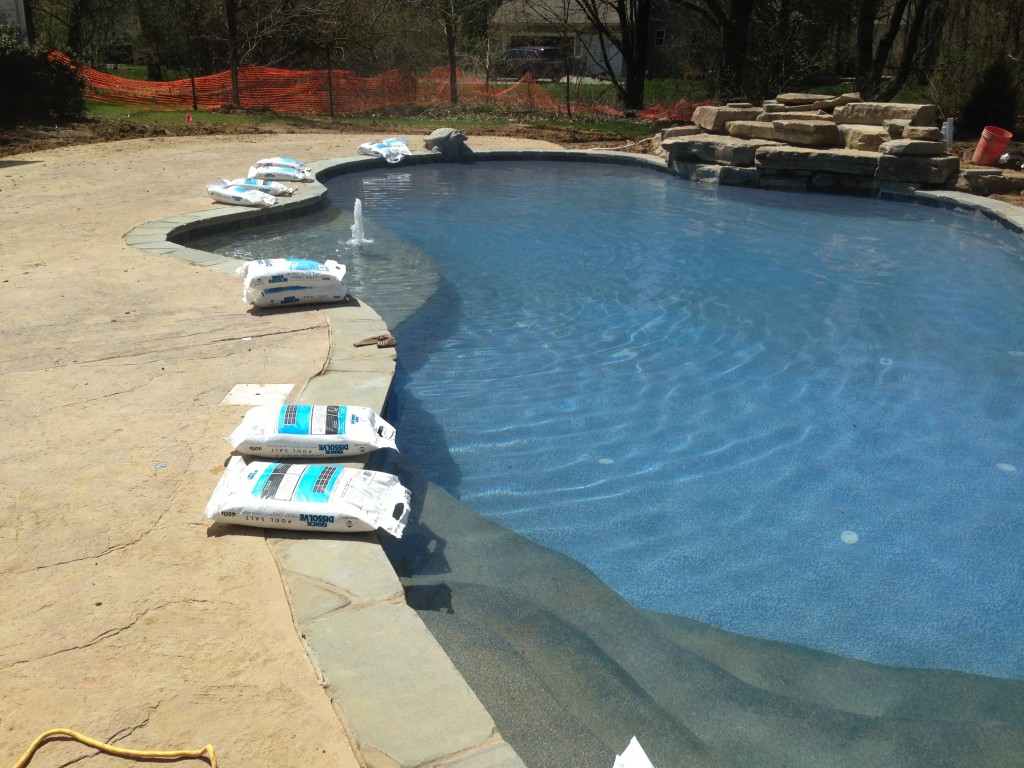
How do I add the salt?
Pour it in. Agitation, sweeping, or brushing will help the salt dissolve faster. It will happen even faster if you turn on the pump, open the bottom drain, and add the salt over the drain. Running the pump for about 24 hours will dissolve it evenly throughout the pool. Granular salt will dissolve 60 – 70% before even hitting bottom. The remaining salt can simply be brushed into the drain. Other forms of salt, take longer to dissolve but the same actions will make apply.
What happens if I add too much?
You will have salty tasting water, but there is no harm done to your chlorine generating system. Some people like more salt because it is closer to their natural salinity level. It’s more comfortable for them. The chlorine generating units will tell you when there is too much salt in the water for them to function properly, and you can drain some and refill with fresh water at that point.
pH/Total Alkalinity in Salt Water Pools
The pH and Alkalinity need to be constantly monitored to make sure they stay in optimal operating levels for the pool. Muratic Acid or pH reducer needs to be added most often since the generator is making liquid chlorine with a pH of about 13%, by the time it affects the pool it’s about 8.5%, which is above the optimal level of 7.4 in a pool. This can be added by hand, or there is a dispenser unit available that will do it automatically as well. (an example is pictured below)
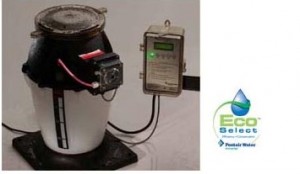
The IMPORTANCE of a Zinc Anode
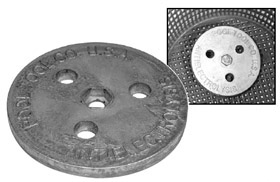
Yes, you ABSOLUTELY MUST have a zinc anode on a salt water pool! One option
for a zinc anode is a small round disc that is secured in your skimmer basket – it’s a small, yet important part of the system.
What does a zinc anode do? It is protects the metal components of your swimming pool from corrosion. The zinc anode will be the first thing to corrode, saving the other parts of your pool from corrosion. We are happy to quote a salt system if you might want to convert your pool to a salt/chlorine generating pool. If you have a salt pool already – double check to make sure you have a zinc anode. They are often overlooked, and are a critical part of your system.
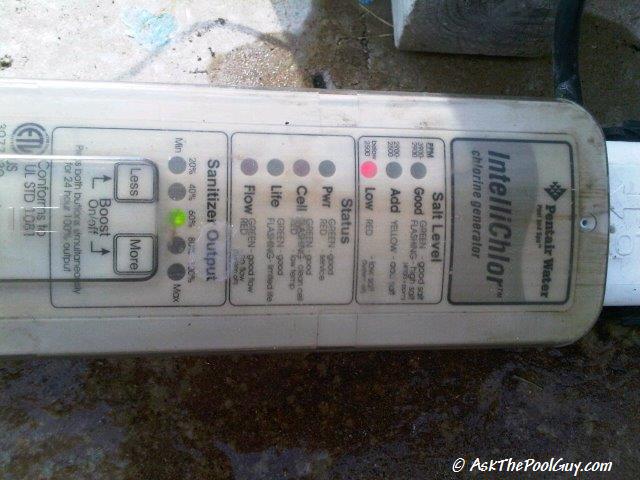
Give us a call for a complimentary quote on a chlorine generating system!
If you are interested in a chlorine generating system, we are happy to quote the install for you. Our quote will depend on the size of your pool and existing equipment set up. We will quote an all inclusive package including the salt cell, power unit, installation, salt for in the pool, and the small but important zinc anode.
- IntelliChlor Quick Start Guide and Tips English
- IntelliChlor Owners Manual Version 3 units after Nov 2011 English
- IntelliChlor Owners Manual Version 2 units before Nov 2011 English
- IntelliChlor Power Center Installation and User’s Guide (IC60, IC40 and IC20) (English)
- IntelliChlor Flow Switch Replacement Kit Installation Guide English
- IntelliChlor Electrolytic Cell Acid Cleaning Kit Instructions English
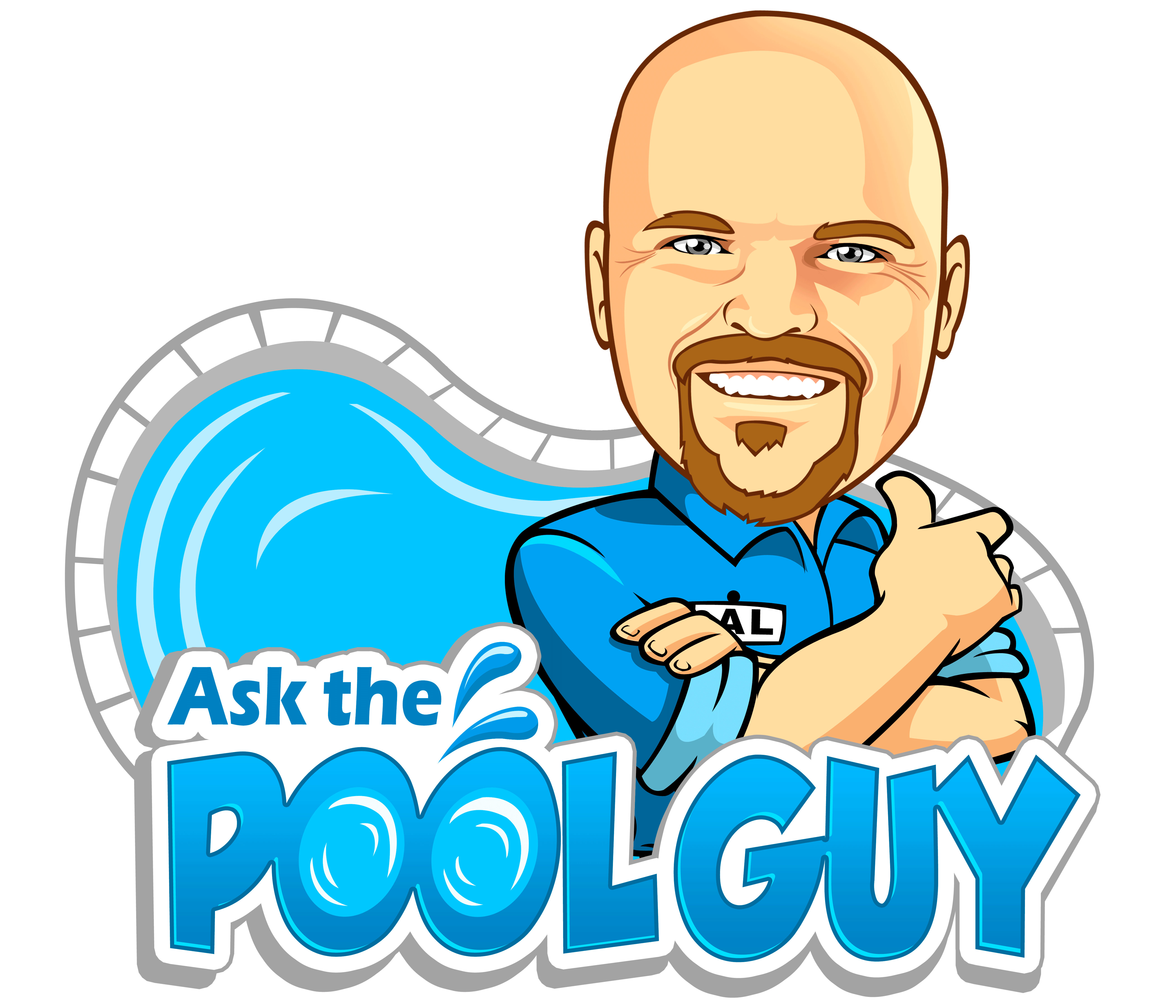
Is there a difference between a salt water chlorinator generator and a salt water cell?
https://askthepoolguy.com/questions/question/chorine-generator-or-salt-water-cell/answer/19433/
Hi! Thanks a bunch for all your articles. This is my first pool and have a big learning curve but am loving my Intellichlor salt water chlorinator. Where would I find a zinc anode? The previous owners flipped the house and they didn’t know anything about pools either. Thank you for your time.
Thanks for visiting our site – I am glad you find the information helpful!
You can find an assortment of zinc anodes here: https://askthepoolguy.com/?s=anode&post_type=product&submit=
Just determine where you would like to install it – ie the basket weight or ladder anode are simple to install, or for a better (not going to fall out or get lost) the inline anodes are even better.